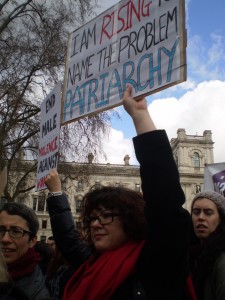Women’s House Brisbane recently highlighted their concerns about the potential loss of women’s only services in Queensland.
“Women’s House is outraged at the recent loss of many valuable services for women and children, in particular, domestic violence refuges in New South Wales. Staff at Women’s House believe that women’s refuges in Queensland will be put out to tender next year.”
This issue was raised in my previous post on this, where Women’s refuges were put out to tender earlier this year in NSW.
This has led to smaller specialist domestic violence refuges losing their funding to larger generic welfare organizations – many of them religious. And as the article points out, they “have an appalling record in relation to survivors of violence” – just take a look at Royal Commission into Institutional Responses to Child Sexual Abuse.
Over 20 refuges in NSW have been de-funded. Larger generic organizations are able to offer cheaper services by cutting specialized services for women and children.
Australia is not alone in this backlash against feminist services.
Karen Ingala Smith has been interviewed by Socialist Resistance.
Karen is the chief executive of nia, a charity with a feminist ethos supporting women who have suffered sexual and domestic violence in the U.K.
“We’ve lost too many specialist women’s organisations and it is continuing. It’s harder and harder for independent women-led organisations to survive, and the fight to survive takes away energy that we should be spending on supporting women, girls and children and campaigning for change.”
Tenders are going to large organizations that aren’t specialist women’s organizations. She gives an example:
“The local area did not lose refuge spaces but in order to meet the lower contract value, the new organisation managed to circumvent employment protection laws and made all the existing staff team redundant, offering them new contracts at lower rates, more hours per week and less annual leave. Most accepted. Since then, as staff left and new ones were recruited, salaries were offered at lower rates. With this sort of contracting the central focus becomes not ‘What could we do for women and children with this money?’ but ‘How could we deliver the specification outlined in this contract – and nothing more – for the least possible cost?’”
Both articles point out the importance of feminist, women’s specialist and women-only services.
“It means that our work names male violence and that services are provided in a framework which recognises that there are inequalities between women and men in society, and that male violence against women and girls is both a cause and a consequence of inequality. That we don’t see male violence against women as reducible to individual acts perpetrated by individual men, but as a key instrument of men’s domination of women, supported and normalised by patriarchal institutions, attitudes and social norms and values.”
It is not just about delivery of services but about activism and awareness-raising about male violence against women and children. It is about recognizing that male violence against women and children is not about individual pathology – it’s a social problem embedded in our patriarchal society.
“Women’s refuges in Australia have a proud legacy and wealth of experience and skills in working with women and children who have experienced violence and abuse. Refuge workers have a well-developed understanding of the nature and impact of violence against women and children. They understand that women are not to blame for the violence perpetrated against them and that rather, it is part of a much wider systemic problem.”
“For the sake of women and their children who are desperate to break free from abuse, Women’s House urges the Queensland government not to follow the course taken by NSW. It is essential that the Queensland government funds refuges that have a specialised focus on women and children and a diversity of services which meet the variety of needs required by those affected by violence.”
Women’s House opened the first domestic violence refuge in Queensland in 1974. It has a public office in Woolloongabba and provides services for women who have experienced domestic violence and sexual assault.” .
Woollongabba Womens House is a cooperative that runs Women’s Shelters in and around Woollongabba in Brisbane’s inner South.
Karen also runs a blog which counts women who have been killed.
And here is the updated number from Australia’s Destroy the Joint





